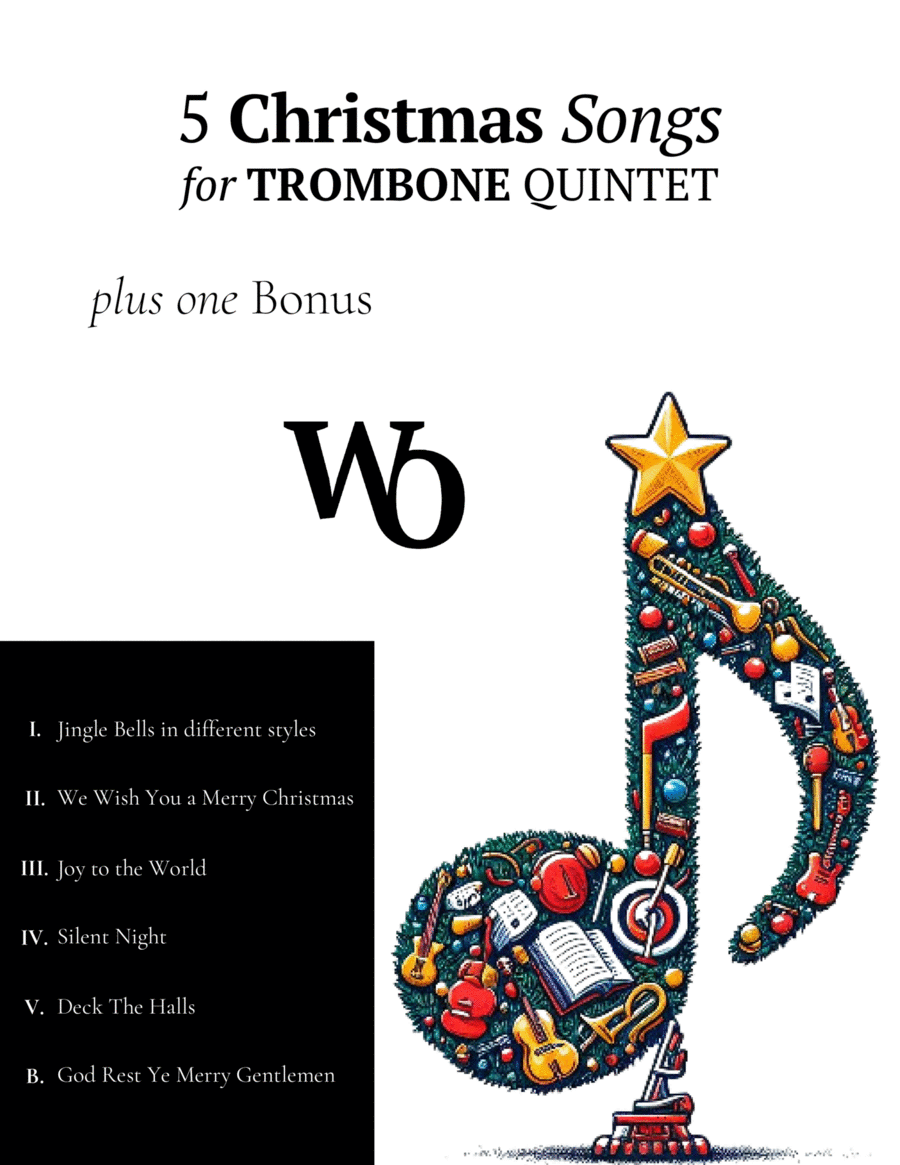Trombone Quintet Bass Trombone - Level 3 - Digital Download SKU: A0.1348482 Composed by Various. Arranged by Ander. Chamber,Christmas. 104 pages. Woods Only, Arrangements #933259. Published by Woods Only, Arrangements (A0.1348482). We present our enchanting Collection of Christmas Arrangements for Trombone Quintet, specially crafted for the festive Christmas season! Delight in the spirit of Christmas with these innovative interpretations of timeless classics, meticulously crafted to bring joy and magic to your musical repertoire.1 - Jingle Bells in Different Styles:Are you ready for a musical journey through various styles of Jingle Bells? Our arrangement for Trombone Quintet takes you from a slow and gentle opening to an animated version, exploring waltz and samba styles along the way. Perfect for Christmas parties, chamber music groups, recitals, and concerts, this unique arrangement is a charming twist on a holiday favorite. Don’t miss the chance to surprise and delight your audience with this creative interpretation!2 - We Wish You a Merry Christmas:Step into the magic of Christmas with our innovative arrangement for Trombone Quintet of We Wish You a Merry Christmas. This score breathes new life into the classic melody, creating an enchanting atmosphere while preserving the essence of the original work. Ideal for Christmas events, recitals, concerts, and educational purposes, this arrangement is a valuable addition to any musical collection. Embrace the universal language of music and charm your audience with this special interpretation.3 - Joy to the World:Immerse yourself in the beauty of our reimagined arrangement for Trombone Quintet of Joy to the World. This classic Christmas hymn takes on a new and magical guise, exploring new rhythms, harmonies, and counterpoints without losing the original essence. Perfect for Christmas events, recitals, concerts, and music education, this arrangement highlights the beauty and creativity that will captivate every listener. Be part of the history of this wonderful song with our exclusive score.4 - Silent Night:Step into the serene magic of our arrangement for Silent Night, a beloved Christmas song translated into over 300 languages. Originally composed in 1818, this rendition captures the longing for redemption and peace, making it perfect for various Christmas occasions. Dive into the historical significance of the piece and add a touch of magic to your musical repertoire with our innovative arrangement.5 - Deck the Halls:Enter the enchanting world of our arrangement for Trombone Quintet of Deck the Halls. This interpretation offers a fresh and magical perspective on the traditional melody, making it perfect for Christmas events, recitals, concerts, and music education. Originating from the 16th-century Welsh melody, this arrangement adds a modern touch while preserving the essence of the historical piece. Elevate your Christmas celebrations with this charming and historically rich arrangement.Bonus - God Rest Ye Merry Gentlemen:Uncover the beauty of Christmas with our arrangement for Trombone Quintet of God Rest Ye Merry Gentlemen. This timeless English Christmas song is reborn in this innovative interpretation, maintaining the original essence while breathing new life into the melody. Whether for chamber music recitals, concerts, public shows, or educational purposes, this arrangement is a perfect blend of tradition and innovation. Capture the magic of Christmas and add this valuable piece to your repertoire today!Our Christmas Collection for Trombone Quintet is a testament to the transformative power of music. Each arrangement is a journey, taking familiar melodies and presenting them in a new light that is both innovative and respectful of their origins. These arrangements are more than just music; they are an invitation to experience the joy, wonder, and magic of Christmas in a unique and unforgettable way. So, whether you're a seasoned musician or a beginner, we invite you to explore these arrangements and let the music fill your heart with the spirit of Christmas. Enjoy the journey!
